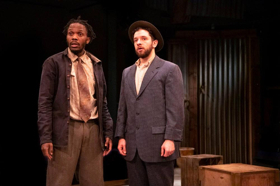Review: BLOOD KNOT, Orange Tree Theatre

![]() Family ties are complicated things. Those we are connected to through blood are often those we love the most, but who we can also treat the most poorly. Athol Fugard's visceral 1961 play, Blood Knot, is a story about brotherhood and how you view your family and yourself, set in the brutal world of apartheid.
Family ties are complicated things. Those we are connected to through blood are often those we love the most, but who we can also treat the most poorly. Athol Fugard's visceral 1961 play, Blood Knot, is a story about brotherhood and how you view your family and yourself, set in the brutal world of apartheid.
Morrie and Zach are half-brothers living in a run-down shack in 1961 South Africa. They are black, but Morrie has skin light enough that he can pass as white. Morrie is also literate and so takes on the letter-writing when Zach wants to take on a female pen pal. The woman turns out to be white, so when she decides she wants to meet Zach, he begs his light-skinned brother to take his place. The situation then spirals out of control and ugly prejudices rise from unlikely places.
Most of the, slightly over-long, first half of the production concentrates on the relationship between the brothers, hinting at their differing pasts and how they came to be together again.
It is the second act where things unravel. In preparation for the visit of the white pen pal Ethel, Zach spends all their savings on clothes that will convince Ethel that Morrie is a white man. In a situation that starts as a role-playing game, Morrie transforms into a brutal white overseer; ignoring, abusing and spitting racial abuse at his brother. This scene is visceral; the men are brothers, but at that moment, they are strangers.
The production is an intense two-hander. Director Matthew Xia maintains audience attention throughout, using moments of levity, then quickly darkening the atmosphere. Both actors rise to the challenge admirably, revealing convincing chemistry and maintaining differing South African accents consistently. Significantly, they are both completely believable in their roles.
Nathan McMullen takes on the role of Morrie. He begins as the subservient brother; washing Zach's feet, cooking him dinner each night and saving every penny for their future of buying a farm together. McMullen is excellent in the role, starting as a bundle of nervous energy, constantly chattering and keeping to a strict timetable. His transformation into his role as the white man is tentative at first, but he visibly grows in stature and confidence as he gets immersed in the controlling character.
Kalungi Ssebandeke is very convincing as Zach, a man who concentrates on his present; a harsh boss, aching feet, his need for a woman. He is easily distracted, veering between heavy shuffling home from work to animated jumping around the stage as he gets increasingly excited about Ethel.
The context of this play is crucial. First produced a year after the Sharpeville massacre, where 69 unarmed black protesters were killed by police, Fugard raises many awkward questions about race and perception of race. It cleverly exposes the cultural construction of racism by subverting the supposed differences between races.
Morrie very quickly takes on the characteristics of a white man who believes he is superior, becoming cruel and violent towards Zach. Zach himself is not immune to poor behaviour; his recollection of a past sexual encounter, that was clearly a rape, is unsettling in the suggestion of the stereotype of the savage black man.
The play has consistently been performed with white actors used to pay Morrie, going back to when Fugard played the role himself back in 1961. The obvious issue with continuing to do this is that it could be viewed as potentially taking away an acting role from a black man. In essence, it also raises thoughts as to how a white man can fully understand the challenges of a black man if he has not experienced that life. However, McMullen is actually of mixed heritage, even though he appears to be white. It is challenging for the audience to reach a satisfying conclusion about this issue.
The production looks very atmospheric, with Basia Binkowska's design of the run-down shack complimented by Xana's intricate sound design which features subtle mosquito buzzing, neighbourhood children crying and haunting echoes of Morrie's alarm clock. Ciarán Cunningham's lighting design is immersive and intimate, although some of the scenes are lit so moodily, it can be hard to see the actors themselves.
This is not a play of hope or redemption; the bond between the brothers is a tortured one. Race poisons the relationship between brothers and racial hatred infects everything in between. There is no happy resolution here, but this is a highly engaging production that provokes thought, debate and personal examination.
Blood Knot is at the Orange Tree Theatre until 20 April
Photo Credit: Richard Hubert Smith
Reader Reviews

Videos

